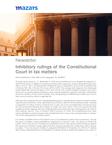
Inhibitory rulings of the Constitutional Court in tax matters
Through communiqué N. 17, dated May 9, 2018, the Constitutional Court released its judgment C-039 of 2018 where, in addition to ordering the lifting of the suspension of terms decreed through Auto 305 of June 21, 2017, it declared itself inhibited to issue a substantive ruling on the constitutionality of Articles 184, 185, 218 and 219 of Law 1819 of 2016. The charges with respect to the challenged articles dealt with how the increase in VAT, from 16% to 19%, and the alleged increase in the cost of items such as sanitary pads and tampons, stevia-based sweeteners, gasoline and Acpm affected the economic situation of low-income families, thus transgressing constitutional principles such as the vital minimum and the right to a dignified life.
Although the Constitutional Court had admitted the lawsuit, considering then that the charges met the requirements of certainty, clarity, specificity and sufficiency, after the entire judicial process -including a suspension for lifting of terms of almost one (1) year- the Court concluded that it should not issue any pronouncement because the charges no longer met such criteria. This is the second time that something similar happens with the constitutionality claims that have been filed against Law 1819 of 2016 (last tax reform). Thus, in Ruling C-002 of January 31, 2018, the Constitutional Court, after having admitted for study the lawsuit also inhibited itself from ruling on the constitutionality of nineteen (19) norms belonging to the last tax reform.
It is frankly incredible that it is the highest Court of Constitutional Justice that is preventing -through this type of inhibitory rulings preceded by suspensions of almost 1 year- the access of citizens to justice. All the high Courts, including the Constitutional Court, have pronounced themselves against the issuance of inhibitory rulings stating that they seriously threaten the fundamental right of access to justice. Thus, the Council of State, in judgment 2004-6201 of December 10, 2015 (C.P. Sandra Ibarra Vélez) indicated that it is the obligation of judicial officials to study the existence of an action in its structure "so that the inhibitory ruling is not reasonable after the process has been processed, because this action circumvents the rights of the administered to obtain a ruling of merit".
Similarly, the Supreme Court of Justice, in a Civil Cassation decision dated November 11, 2004 (M.P. Carlos Ignacio Jaramillo), stated that "(...) the inhibitory judgment, as a rule, is a pronouncement that blurs the exercise of the judicial function, in whose actions, by the way, substantial law must prevail. Although formally it is a ruling, the inhibition, in material terms, is the denial of the expected pronouncement that should put an end to the legal conflict". Finally, the same Constitutional Court, in Auto 027 of 1996 (M.P. Antonio Barrera Carbonell), when decreeing the nullity due to an inhibitory sentence in a tutela action, indicated "for modern procedural law, the so-called inhibitory sentences are a horror, because they deny the right to justice and a fair order, reflect the wrong direction and composition of the trial and are not compatible with the powers recognized to the judge to conduct and integrate the process in the manner and with the elements required to conclude with a definitive and substantive solution (...)".
In his essay entitled Inhibitory rulings hinder effective access to the administration of justice, attorney Medardo Medina questions whether these rulings (inhibitory rulings) are nothing more than the prolongation of conflicts that justice is precisely called upon to resolve. Robert Kennedy's famous phrase "to defer justice is to deny democracy" may be the answer to this question. If the result of the democratic system has been the tri-division of powers and the system of checks and balances between the different branches of public power, the denial and deferral of justice -via inhibitory rulings- is the pure negation of the democratic values of a society.
There are almost sixty (60) processes against Law 1819 of 2016 in the Constitutional Court, of which almost half have managed to pass the tough initial admission barriers in said institution. These processes have been suspended almost a year ago due to the fact that said institution defined to give priority to the resolution of all legal issues related to the Peace Agreement with the Farc, before proceeding to rule on them. If the issuance of inhibitory rulings by the Constitutional Court, in tax matters, becomes the general rule, then we will be living what the same Court in its Auto 027 of 1996 qualifies as the "legal horror".


